The Great Illusion – Now (Part 2)
By Stephen Berry
In Part 1 of this review ( http://www.la-articles.org.uk/tgi.htm ) I gave an exposition of Norman Angell's views on foreign policy and the problem of war. Originally written in 1908 ( The Great Illusion – Now is the 1939 reprint ), Angell's book demonstrated that in the case of war even the victors lost economically. He showed that they would not be able to enlarge their trade by war or even compel the vanquished to defray the costs of war by indemnities. In short, the widespread belief that one great nation could use force over another to gain immense material advantage was simply false. Angell further suggested that victory in a war against Germany would not necessarily remove the threat of German militarism or render democratic institutions more secure and events after 1918 were to amply support these warnings. I believe Angell's analysis to be substantially correct and the best and most eloquent exposition of the classical liberal case against war.
Angell thought that the solution to the problem of war was “to make of power in the international field what it is within the nation, an instrument whereby the settlement of disputes by the sheer brute force of one of the parties is made impossible by common and collective resistance to aggression, by common defence of the one supreme law that no nation should use war to enforce its view of its rights.” (P. 16) During the 1930s, adherence to this principle meant that Angell, a champion of The League of Nations, would have supported the use of force by The League against Japan over Manchuria and China, against Italy over Abyssinia, and against Germany over the Sudetenland. The somewhat paradoxical consequence is that Angell, a man who had written on the devastating consequences of war, became in the 1930s an arch exponent of the anti-appeasement line which is today identified with Winston Spencer Churchill. We should make no bones about the fact that this was a policy which made war very likely for Britain. That Churchill should support such a policy was not unexpected. That Angell did requires further examination. Does the classical liberal case against war demand adherence to the doctrine that there should be a common defence of the ‘one supreme law' that no nation should use war to enforce its view of its own rights?
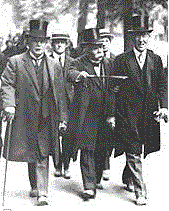
David Lloyd George, Georges Clemenceau, and Woodrow Wilson at Versailles in 1919
At one point Angell says, ‘To have said in 1935; “We shall defend the Covenant (i.e. Abyssinia) precisely as we would defend Kenya ( in 1930s Kenya was a British Colony – author's note )” would not have meant bombs on London any more than our known intention to defend Kenya means bombs on London.' (P.42) The Covenant here, is the Covenant of the League of Nations and Angell is arguing that it should have been invoked by the UK to oppose the Italian invasion of Abyssinia. What does this in effect mean? Nothing less than that British foreign policy should be geared to preserving the principle that force must not rule in the post-Versailles world. The traditional view that foreign policy should be about preserving national and economic security would take a back seat. The collapse of the Soviet Empire in 1989 has been interpreted by the neo-conservatives in the U.S. as a call for that country to police the world. The defeat of Germany in 1918 was clearly seen by some as an opportunity for the UK (preferably in conjunction with France) to uphold the Covenant of the League of Nations, police large tracts of the world and maintain the Versailles settlement.
Certain obvious problems presented themselves. Aspiring imperial powers like Italy and Japan thought that the sudden opposition of the world's premier imperial power to the use of force a little strange. Yosuke Matsuoka, who led the Japanese delegation at Geneva, commented about the new attitude to imperialism post-Versailles: “The Western powers taught the Japanese the game of poker but after acquiring most of the chips they pronounced the game immoral and took up contract bridge.” When a French woman informed Churchill that Italy was only doing in Ethiopia what Britain had practised for centuries, Churchill replied, “Ah, but you see, all that belongs to the unregenerate past, is locked away in the limbo of the old, wicked days. The world progresses.” (Both these quotations are taken for the excellent book, Churchill, Hitler and the Unnecessary War by Patrick J. Buchanan, P. 150)
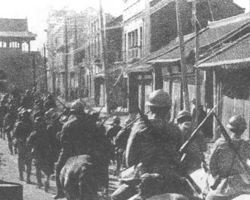
Japanese troops in Manchuria in 1931
How very convenient that Britain should want to abolish the use of force in the foreign relations when her empire had reached its zenith. Angell ought to have asked himself if the world of nation states in the 1930s could ever work in the fashion he wished. As the power of a nation state declines in the world so does its ability to maintain its world position. In the interwar years the UK had a population of around 45 million with France around the same. But Germany had a population of 70 million, Japan 70 million, Italy 45 million and the USSR almost 200 million. Were Britain and France really in a position to police the world and ensure that both the Covenant of the League of Nations and (implicitly) their empires were preserved?
Far more plausible for the UK would have been a policy of restraint which recognised the limits of British power in the world and, in particular, Europe. Pat Buchanan in Churchill, Hitler and the Unnecessary War makes a strong case that the loss of Japan and Italy as allies in the interwar years placed the British Empire in jeopardy. To reject the renewal of the Japanese alliance in the 1920s placed the British Empire in East Asia in jeopardy and was an affront to Japan. British policy towards Mussolini in the mid-1930s led the League of Nations into imposing sanctions which were too weak to make him give up the conquest of Ethiopia, but sufficiently annoying to turn Italy into an enemy of the UK and thereby destroy all hope of a united front against Germany. I am not the most ardent supporter of the British Empire but, given that it was in existence in the 1920s and 1930s and the British were not about to dismantle it, to pursue policies which endangered the Empire can only be looked upon as perverse. Pursuing a League of Nations agenda and antagonising Japan and Italy was not a recipe for peace, rather it meant the creation of enemies who would be militarily dangerous to Britain.
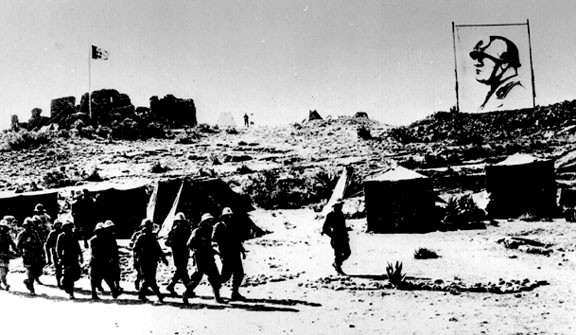
Italian troops march past billboard of Mussolini during 1936 invasion of Ethiopia
The main issue of British foreign policy in the 1930s was what to do about Germany and the National Socialists. There has been much criticism of the appeasers of the 1930s, but their position was perfectly sensible. Though the Treaty of Versailles had lifted the principle of national self-determination to an almost religious level, the only major nation to have been excluded from this principle was Germany. German minorities were scattered around Eastern Europe and an obvious source of friction. The appeasers were amenable to the problems of these minorities being settled, as long as it was done at conferences and by the normal means of diplomacy.
The anti-appeasers wanted to make a stand against German policy in Eastern Europe and logically, this made war with Germany more likely. When the anti-appeasers eventually had their way and a stand was made against Germany over Poland, war did indeed occur, with devastating consequences for Britain. Over 60 years have passed since World War Two and the evidence seems pretty clear that Hitler's expansionist foreign policy was not aimed at damaging the UK but looked eastwards to the Ukraine. Angell correctly points out that the Nazis were stirring up dissension amongst German minorities in areas of Eastern Europe. Buchanan, in his book, mentions that German minorities in Alsace and Eastern Belgium were never encouraged in the same way.
Angell is fully aware of Hitler's grand plan. “Germany possessed what most people do not: a Testament, a Bible of its national policy, accepted as Holy writ, inculcated in every school, taught religiously to every boy and girl. That Bible is, of course, Hitler's Mein Kampf ….” (P. 69) Angell notes that Hitler believed the Germans to be superior to other nations but did not have enough land to live on. Hitler discussed four solutions to this problem: 1. birth control; 2. increased productivity of the present area; 3. the expansion of factory production for foreign markets; 4. annexation of new land.
The first Hitler rejected on racial grounds. The second he regarded as insufficient. The third was also insufficient and not even desirable as Hitler detested the urbanisation which went with industrialisation. That left the fourth option. Angell quotes the British historian R. C. K. Ensor who had “carefully studied this aspect of the German testament.”
“The scale of the new territory which Mein Kampf contemplates annexing is indicated on page 767, where we are told that, whereas today there are 80 million Germans in Europe, the right policy must look forward a century, and provide land ‘on this continent' where 250 million Germans can live – ‘not squeezed together as factory coolies for the rest of the world, but as peasants and workmen, who through their production assure a livelihood for each other. " Where is this vast area to be found. Herr Hitler does not beat about the bush. It could only be found, he says quite frankly (pp. 154, 772) at the expense of Russia. And Providence has opportunely brought Russia into a state propitious for the enterprise.” (Quoted by Angell (P. 70) from an article by Ensor in the Spectator 1936)
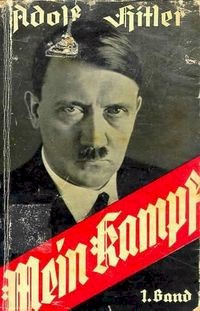
The
cover to the first edition of Hitler's book, Mein Kampf.
But Angell does not draw the correct conclusion from his knowledge of National Socialist aims. He continually stresses that Britain must ally with the USSR to combat Germany policy. But this was an anathema to many Eastern Europeans who feared the Russians more than the Germans. Remember that by 1939 Hitler had killed hundreds whereas Stalin had killed hundreds of thousands. More important, an alliance with the Soviet Union would drag Britain into the intractable and interminable disputes of Eastern Europe. The correct policy for the UK was (as Baldwin said) to leave the Nazis and Bolsheviks to get on with it – if they so wished. A victorious Germany dominating Europe would indeed be a problem for the UK, but no greater than a victorious USSR turned out to be. That the two leading totalitarian states in the world in 1939 should be set on a collision course was not something which should be obviously prevented.
Angell's essential problem lies in the contradiction between his main thesis – that war is hugely damaging – and his support for the League of Nations type foreign policy of the 1930s with Britain acting as international policeman. The sensible policy in the interwar period for the UK would have been to strengthen ties with the French, remain allies with Japan and maintain good relations with Italy (which was initially deeply suspicious of the impact of Hitler). There would have to have been a frank admission that Britain could not make much impact on events in Eastern Europe in the 1930s. But this would have been no different for the UK from the situation which obtained in the 1830s or 1730s. In 1939 Poland was partitioned yet again by the Germans and Russians. But, as in the 1770s and 1790s, there was not much that the UK could do about it. After the Germans marched into Bohemia and Moravia in March 1939 Chamberlain handed out guarantees to Poland, Rumania and Greece stating that these countries would by defended by the UK in the event of aggression. In his book Buchanan quotes a letter from George Kennan which stated, “The British government could not improve anything by offering to the Poles a support they were quite unable to give. They would have done better to shut up, to rearm as speedily as possible, and to avoid further formal commitments of any sort, while waiting the further turn of events.” (P. 274). Precisely.
Instead, a policy was pursued which led inexorably to war, precisely the option which Angell least desired. There is no doubt that, as Pat Buchanan points out, UK policy in the 1930s was a microcosm of US policy at the beginning of the 21st century. It can be described as a policy of minding everyone's business but your own and it is a principle which leads to endless damaging disputes. This was the case for the UK where the result was World War Two, massive loss of life, economic catastrophe, loss of Empire and a savage dose of state socialism.
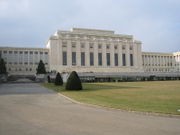
Headquarters of the League of Nations in Geneva
Yes, Angell was right in his pre-WW1 book that war is an unmitigated evil. But he did not draw the correct conclusions for foreign policy. The ideal policy for a country to avoid war would be non-intervention in the various national disputes which abound in the world. The fact that a particular intervention might be sanctioned by the League of Nations or United Nations is by the bye. A straightforward non-interventionist policy was not possible for an imperial power like the UK in the 1930s. The second best policy would have been something akin to the containment strategy which George Kennan called for in the case of the US v the Soviet Union in the late 1940s. There should have been a realistic look at what was and was not essential for the maintenance of British security. Such an assessment had never before included the drawing of the boundaries of states in Eastern Europe. Above all, the prospect of war between Germany and the USSR in the 1930s should have been as much of a worry for the UK as a conflict between the USSR and China in the 1960s was to the USA.
See http://www.la-articles.org.uk/tgi.htm for the first part of the review of Norman Angell's The Great Illusion – Now .![]()
 Top 50 books of all time : by Old Hickory:-
Top 50 books of all time : by Old Hickory:-
"I have limited the selection to the books I have read. I keep to the norm of not recommending to others books I have yet to read. Clearly, books I have not read by now suggests a judgement of some sort."
PDF version
of this article
![]()
Download
Requires Adobe Acrobat Reader. This is available
for free at www.adobe.com
and on many free CDs.

The Alternative
Bookshop
Which specialises in,
but does not limit itself
to, books on Liberty
and Freedom ... Book
reviews, links,
bestsellers, rareties,
second— hand,
best price on books,
find rare books.
|
|
|
|
|